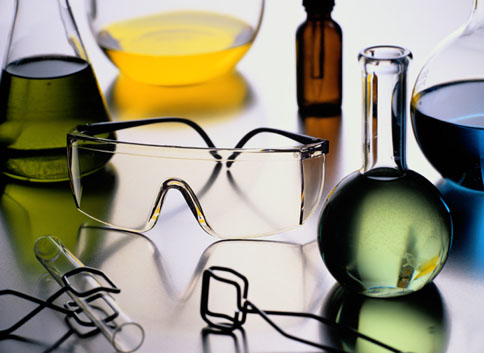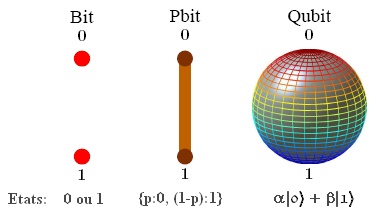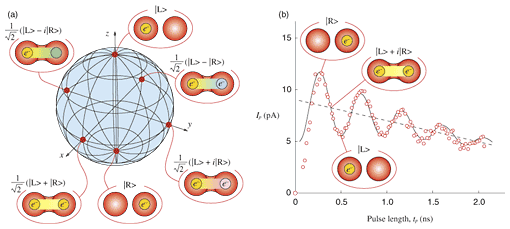Everyone is aware of bytes which are composed of bits, but there have been questions and researches whether we can use a single atomic nucleus and even an electron to store and transfer information, respectively.
Scientists have bombarded single silicone crystals with boosted amounts of radio waves and it resulted into a burst of billions of subatomic silicon particles. The most optimistic researchers immediately questioned whether we can now perform a construction of ultrafast computers with atomic nuclei as a storage and electrons as mediators, which could carry information back and forth.
A single qubit can be described only using complex numbers. Where a classic bit can be either in a state (1) or (0) , a qubite can perform these both states simultaneosly at a certain degree of probability. It is said that a qubit can perform also two superpositions of these basic states.
It can be described by

where a and b are complex numbers and they must agree with the following statement:
| a | 2 + | b | 2 = 1
a , b are called amplitudes of probability and a sequence of 8 qubits is called qubyte, a quantum equivalent to byte.
Although it may seem confusing, we can't determine with any measurement the precise state of a or b (whether it is ''more'' in 0;1; or one of the superpositions -> the only exception is when the qubit is directly in one of its ground states - 0 or 1) , we can choose values only randomly and the probability of our guess is in accordance with amplitudes od probability.
when | a | = | b | and because squares of sizes of a,b are always 1, then there is 50% probabilty of finding qubit's state and therefore the result of measuring is absolutely random.
probability illustration:
The next problem is that the sole measure affect the state of qubit and change it to something else - this phenomena is called colapse of wave function.
As a result of the scientific facts above - we can say that qubit can be in 0 and 1 at once and therefore modern supercomputers would be able to compute exponentially larger amounts of data than are today's conventional computers.
In conventional computers, transistors store information on the basis of whether they are on or off. In the experiment, qubits store information in the form of the orientation, or spin, of an atomic nucleus or an electron.
Of course, there is a catch. The qubits need to be ''entangled''' at subatomic level in order to function(store information) Even if two qubits are extremely far from each other, they need to change one another in a case that one is affected by some impuls from outside. And yet scientists have found unimaginably difficult to keep qubits in entanglement for a longer period of time both in the name of energy and still, lack of sufficient technology.
Ultimately, some people view this experiment as very promising in the future when others say this is a neat scientific discovery, but it is very unlikely to be put into computer reality ever.
But the future is always uncertain! I personally take sides with this technological innovation of tommorow! :-)
sources :
http://www.nytimes.com/2011/01/25/science/25spin.html?ref=science
http://cs.wikipedia.org/wiki/Qubit
http://neel.cnrs.fr/spip.php?rubrique481
http://www.ipod.org.uk/reality/reality_entangled.asp
https://www.ntt-review.jp/archive/ntttechnical.php?contents=ntr200801sp4.html
http://www.astrosurf.com/luxorion/ordinateur-quantique.htm
http://www.openclipart.org/detail/qubit-bloch-sphere-by-gcross














